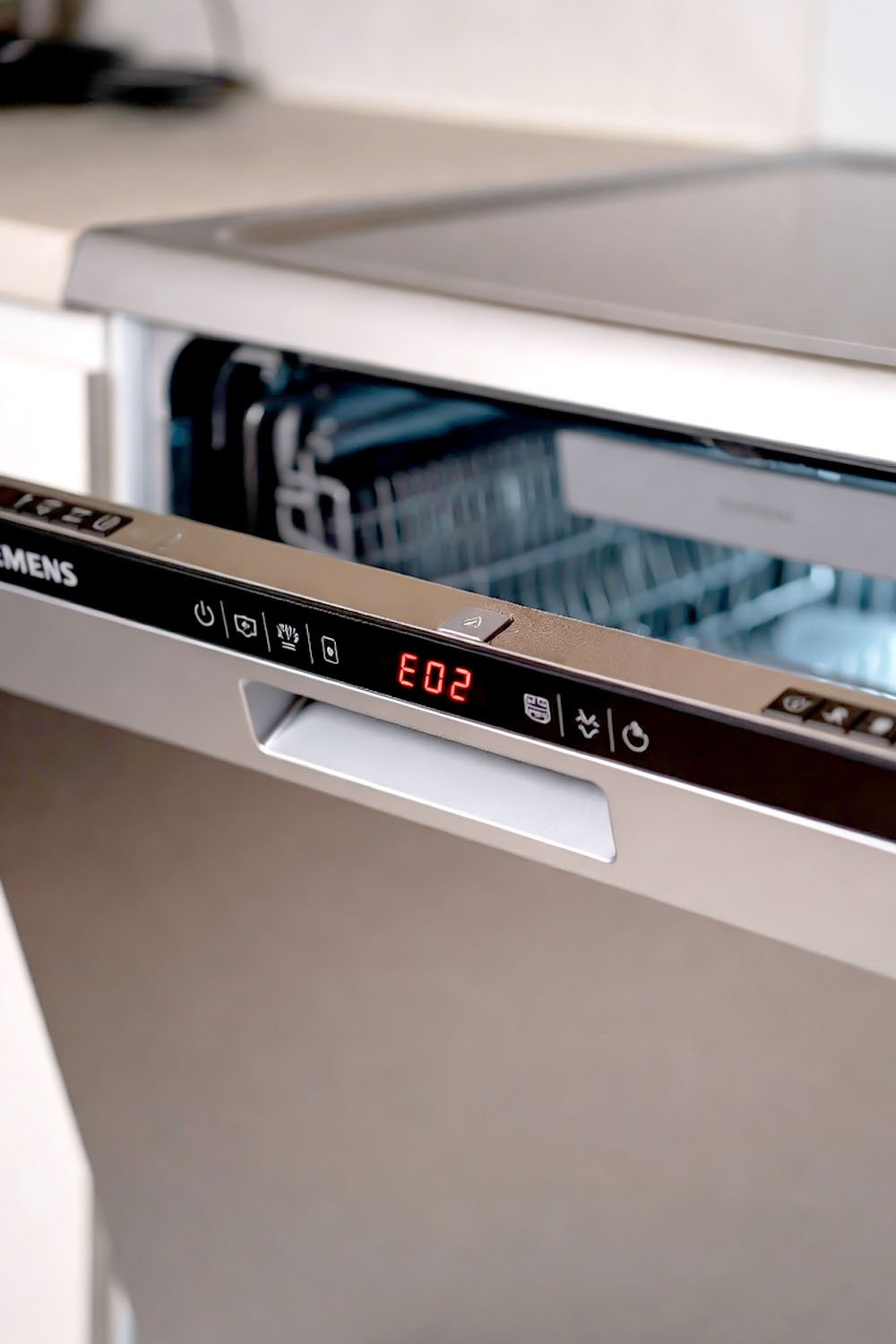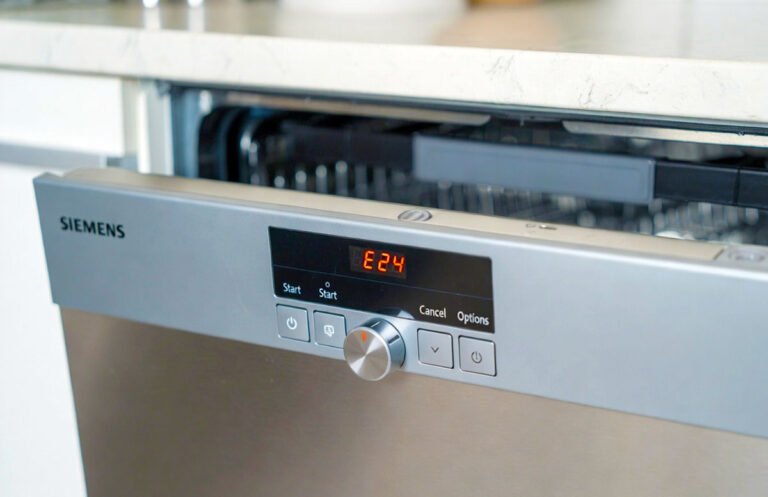As an Amazon Associate, I earn from qualifying purchases at no extra cost to you.
How Long Do Frigidaire Dishwashers Run: The Truth Revealed
I remember loading my dishwasher late one evening, thinking it would finish before bed, but the cycle kept humming much longer than expected. That tiny moment made me curious, and maybe you’ve felt the same. Sometimes you wonder if something is wrong, or if modern dishwashers simply take longer. With Frigidaire models, timing often surprises people, yet there’s a reason behind each cycle length.
Run a normal wash when dishes are only lightly dirty and aim for around 2 hours. Choose heavy wash for greasy pots, and expect 2.5 to 4 hours. Use quick wash for fast cleaning under 1 hour, especially when hosting guests. Always clean the filter monthly to avoid longer times. Run hot water before starting. Check water temperature. Avoid overloading racks. Dry cycles add extra minutes.
Normal Cycle Duration and What Affects It
A normal cycle on a Frigidaire dishwasher usually runs around 2 to 2.5 hours, depending on soil level and model. Many people assume dishwashers should work as fast as older ones, but modern machines focus more on saving energy and water. That means longer run time, even if it feels odd at first. I used to check the clock impatiently too, but then I noticed cleaner dishes in the end.
However, cycle time changes if the dishwasher senses heavier soil. For example, if you had a pasta night with sticky sauce on bowls, the machine adjusts washing time. It’s pretty smart, and that’s helpful because you don’t need to guess settings perfectly. The dishwasher basically does the thinking for you. Still, I always scrape plates lightly so it doesn’t overwork itself.
Water temperature also plays a big part in how long do Frigidaire dishwashers run. If your tap water starts cold, the unit heats it, slowing the cycle. So, one simple tip is to run your kitchen faucet with hot water for a few seconds first. It’s funny how such a small habit can shave off time. Plus, it helps ensure more effective cleaning from the start.
Additionally, overloaded racks add extra minutes. When every cup and spoon crams into tight corners, the sensor thinks dishes still need cleaning. Instead, try leaving small breathing space between plates. It always feels satisfying seeing everything stacked perfectly, but a little room helps more than you think. And honestly, unloading cleaner dishes is worth it.
- Normal cycles average 2–2.5 hours
- Water temperature and soil level impact time
- Avoid cramming dishes tightly
- Run hot water before starting
Heavy Cycle Timing and Why It Takes Longer
Heavy cycles usually last 2.5 to 4 hours on Frigidaire dishwashers. It sounds long, but think about washing greasy pans and casserole dishes by hand—wouldn’t that take forever too? When I bake something cheesy and sticky, I always pick heavy wash because it handles the scrubbing for me. It almost feels like giving myself a break after a long dinner night.
The machine sprays stronger and heats water higher during heavy cycles, and that extra cleaning power needs time. If you cook dishes with oil and butter often, choosing this cycle prevents residue buildup inside the dishwasher. Otherwise, you might notice cloudy glasses or greasy film later on, which easily confuses people into thinking the dishwasher is faulty.
Another thing to note is your water supply. Cooler incoming water means more heating time, so your cycle grows longer. A friend once wondered why her cycle lasted nearly four hours every night. Turned out her water heater was set too low, and the dishwasher was doing all the heating. Just a small home tweak fixed her timing issue fast, which felt like a small win.
If you feel your heavy cycle is overused, try pre-soaking extremely sticky items or giving them a quick rinse. I know some people debate rinsing, but in cases with baked-on sauce, a two-second splash really helps. And remember, heavy wash isn’t for everyday loads, so save it for meals like lasagna or thick gravy nights.
- Heavy cycles run 2.5–4 hours
- Hotter water and deep cleaning require extra time
- Water heater settings matter
- Save heavy cycle for tough messes
Quick Cycle and When to Use It
Quick cycles on Frigidaire dishwashers usually finish within 30 to 60 minutes. This is a lifesaver when guests are coming and you suddenly realize your good plates are dirty. I’ve done that scramble before—set quick wash, wiped counters, and plates were ready before I even finished prepping snacks. It’s handy but works best for lightly soiled dishes.
One thing to remember is that quick wash uses more water and energy to speed things up. It tries to make up for the shorter duration by intensifying power. That’s why I treat it as a convenience cycle rather than a daily option. If I just had sandwiches for lunch, great. But after a big Sunday lunch, normal cycle makes better sense.
Even though quick cycles clean fast, they don’t always dry completely. Sometimes I open the door and give dishes a few minutes of air-drying. It feels like a tiny compromise for the speed. Plus, if you tilt cups slightly, water pockets don’t form inside them, which I learned after one too many pooled-water moments.
This cycle also works nicely for re-washing dishes that sat too long in the cabinet or quickly cleaning reusable containers. So whenever you’re in a rush or short on clean items, this cycle shines. Still, use it with some planning so dishes don’t get dull over time or miss that deep clean occasionally needed.
- Quick wash lasts 30–60 minutes
- Best for lightly dirty dishes
- May need short air-drying time
- Great for last-minute hosting needs
Sensor and Eco Mode Timing Details
Sensor wash cycles use smart technology to detect soil level and water clarity, so timing changes each run. Sometimes it finishes in around 2 hours, and sometimes closer to 3. I like this mode when I’m unsure how dirty dishes are, especially after days with mixed meals. It feels reassuring knowing the dishwasher adjusts itself without guesswork from me.
Eco mode uses less energy and water, which naturally means cycles take longer. People often assume eco means faster because it sounds efficient, but efficiency here focuses on resources, not speed. I once compared loads back-to-back just for curiosity, and eco took almost an hour longer. Still, my energy bill thanked me, and honestly that felt satisfying.
These modes are sensitive to loading habits. If you place bowls over cups or stack utensils too tight, sensors may misread soil level. Then, cycle time stretches. So gentle spacing matters more than we think. It’s a little like packing a suitcase—crowded always slows things down somehow.
Temperature again plays a role, so warm tap water helps here too. If you run eco mode often, cleaning the filter monthly keeps cycles from creeping longer over time. So yes, it’s slower, but it’s also gentle on bills and water usage. Smart trade-off, especially for everyday meals like salads, noodles, and sandwiches.
- Sensor wash adjusts from ~2–3 hours
- Eco mode saves water but runs longer
- Proper loading helps sensors work correctly
- Warm tap water improves timing
Drying Cycle and Added Time
Many Frigidaire dishwashers add 30 to 60 minutes for heated drying, depending on the model. When you choose heated dry, think of it like using a bathroom fan versus letting windows open naturally. The heat helps faster drying, but it needs time to work. I use heated dry when I want spotless glasses without water spots, like before a dinner with friends.
However, air-dry options also exist, saving energy but requiring patience. If you open the door slightly after the wash cycle finishes, steam escapes and speeds up natural drying. I started doing this trick after seeing a technician suggest it, and it works surprisingly well. Dishes cool faster and feel crisp without extra power.
Plastic items are one thing to watch, though. Lightweight containers sometimes flip and trap water, so I place them in upper racks firmly. Also, using rinse aid helps drying time and reduces streaks. I used to skip it, thinking it didn’t matter, but once I tried, dishes genuinely dried quicker and more evenly.
Ultimately, drying time depends on settings and dish type. If you don’t need bone-dry plates immediately, skip heated dry for everyday loads. But if you want fast, spotless results before storing dishes, go ahead and enable it. It’s simply about choosing convenience or energy savings depending on your day.
- Heated dry adds 30–60 minutes
- Crack door open for faster air drying
- Use rinse aid for better results
- Plastics need secure placement
Maintenance Habits That Speed Cycles
Cleaning filters monthly helps keep cycle time steady, roughly 5 minutes of effort. When debris clogs filters, dishwasher sensors think dishes are still dirty, so cycles extend. I once ignored my filter for months, and suddenly cycles got longer and dishes looked dull. A quick clean fixed it immediately. Small habits truly pay off here.
Also, check spray arms for food bits. Spin them gently to ensure they move freely. If water flow gets blocked, the dishwasher compensates by running longer. I sometimes pluck out tiny pasta grains from holes, almost like picking lint from clothes. It’s oddly satisfying and instantly improves performance.
Water hardness matters too. If you notice white spots or chalky residue, your dishwasher works harder to clean and rinse. A simple dishwasher cleaner or water softener pod monthly prevents buildup. I think of it like giving the machine a spa day—it keeps things running smoothly without fuss.
Lastly, avoid stacking dishes over sensors or blocking detergent dispenser. If soap doesn’t release properly, cycles repeat rinsing. A tiny adjustment in loading style speeds things up without effort. These are quiet habits, but over weeks, they make your dishwasher feel newer and faster again.
- Clean filter monthly
- Clear spray arm holes
- Use cleaner for hard water
- Avoid blocking detergent and sensors
Final Thoughts
Knowing how long do Frigidaire dishwashers run helps you plan better meals and evenings without guessing. Every cycle length has purpose, so choosing wisely saves time, energy, and effort. And with a few easy habits like pre-running hot water and cleaning filters, you enjoy fast, clean results. Eventually, it becomes second nature, and your kitchen routine feels smoother.
| Cycle Type | Typical Duration | Best Use |
|---|---|---|
| Normal | 2–2.5 hours | Everyday dish loads |
| Heavy | 2.5–4 hours | Greasy pots and pans |
| Quick | 30–60 minutes | Light loads, hosting rush |
| Eco | 2.5–3.5 hours | Energy and water savings |
| Sensor | 2–3 hours | Mixed soil loads |
| Heated Dry add-on | +30–60 minutes | Spot-free drying |
| Air Dry option | No extra power, slower | Energy savings |
| Pre-heat tap tip | Shortens cycle slightly | Warmer water start |
Frequently Asked Questions (FAQs)
Is it normal for Frigidaire dishwashers to run for 3 hours?
It is normal, especially with modern energy-efficient designs. Today’s dishwashers use less water and energy, so they wash longer to compensate. Think of it like choosing a slow cooker instead of frying—slower but efficient and thorough. If your cycle reaches around 3 hours on heavy or eco settings, that’s expected. However, if timing suddenly jumps much higher than usual, clean the filter and make sure your hot water is warm enough. Also check if you overloaded racks, because overcrowding forces extra rinsing. A little spacing helps performance and speed. When everything is balanced, long cycles simply mean better cleaning without wasting water or electricity.
Is it bad if my dishwasher runs too long?
It’s not necessarily bad, but it can signal maintenance needs. A sudden increase in time often means the machine is heating colder water or struggling with debris. For instance, if your filter is clogged, sensors detect food particles and extend washing. Also, low water temperature adds heating time. So, try flushing your hot tap before starting, clean filters, and remove blockages near spray arms. If everything looks clean and timing still grows unexpectedly, check your water heater temperature setting. Sometimes adjusting just a few degrees helps the dishwasher work without delay. Long runtimes alone don’t harm the appliance, but ignoring signs of buildup may eventually affect performance.
Can I stop the cycle early to speed things up?
You can stop the cycle early if necessary, but you might end up with partially cleaned dishes. It’s like pulling laundry out halfway—the job simply isn’t done. If you accidentally started the wrong cycle, pause and reset at the beginning instead. When you need fast results, choose the quick wash option from the start rather than interrupting mid-run. Also, pre-rinsing very sticky dishes helps complete cycles faster naturally. Only stop cycles early when urgent, like needing one specific dish for unexpected guests. Otherwise, let it finish so sensors and drying stages complete properly, giving you better results without extra manual work.
Do I need to rinse dishes before running a Frigidaire dishwasher?
You don’t need a full rinse; scrape off large food bits instead. Modern dishwashers work better with a little residue because sensors detect soil and adjust washing power. Completely rinsing dishes sometimes confuses the machine and leads to lighter washing than needed. However, thick sauce or baked cheese benefits from a quick splash of water first. I often scrape plates and give sticky bowls a tiny rinse, and it keeps my loads running efficiently. Balance is key: no need to scrub by hand, but avoid big chunks going inside. This routine preserves good timing and cleaning results without extra effort.
Is it okay to run the dishwasher overnight?
Yes, running overnight is common and safe for Frigidaire dishwashers. It’s convenient because cycles finish while you sleep, and the kitchen feels tidy in the morning. Just ensure no flammable items rest nearby, though dishwashers today are built with strong safety features. You can also enable delayed start if your utility rates drop at night. Some people prefer morning runs, but nighttime works well if you want empty sinks before bed. As a habit, check filter monthly so the dishwasher operates smoothly during long unattended cycles. Peace of mind comes from knowing it’s running as designed, quietly and safely.
Can cold water make cycles longer?
Yes, colder water increases runtime because the dishwasher must heat it to reach proper cleaning temperature. When winter hits or your water heater setting is low, cycles noticeably stretch. A simple trick is running your sink on hot for 10–15 seconds before starting the dishwasher. This primes the water line with warmth, helping the machine reach temperature faster. If your house has long plumbing lines, this matters even more. It’s a tiny habit but keeps cycle times normal and cleaning stronger. Think of it like warming up a car engine in cold weather—just a quick prep, and performance improves without much thought.
Do I need rinse aid to speed drying time?
Rinse aid doesn’t shorten the wash cycle, but it does improve drying time significantly. It helps water sheet off dishes faster, preventing droplets and reducing the need for extended heated dry cycles. Without it, plastic items especially come out wet or spotted. Once I started using rinse aid, glasses dried clearer and unloading felt easier. If you want to avoid long heated dry cycles, pair rinse aid with cracking the dishwasher door after the wash finishes. That quick steam escape speeds drying naturally. It’s a small investment that truly pays off in time and better results.
Can poor loading cause longer cycles?
Yes, loading dishes poorly affects spray flow and soil detection, often extending the cycle. When cups stack too tightly or utensils block the detergent dispenser, cleaning becomes uneven. Sensors then interpret lingering particles as dirty dishes, continuing the wash. Try spacing plates slightly, placing bowls angled for water flow, and keeping tall items away from spray arms. I once overloaded everything after a party and noticed a much longer run and streaky glasses. Since spacing more carefully, cycles remained consistent and dishes gleamed. Loading technique really does matter for timing and final shine.








